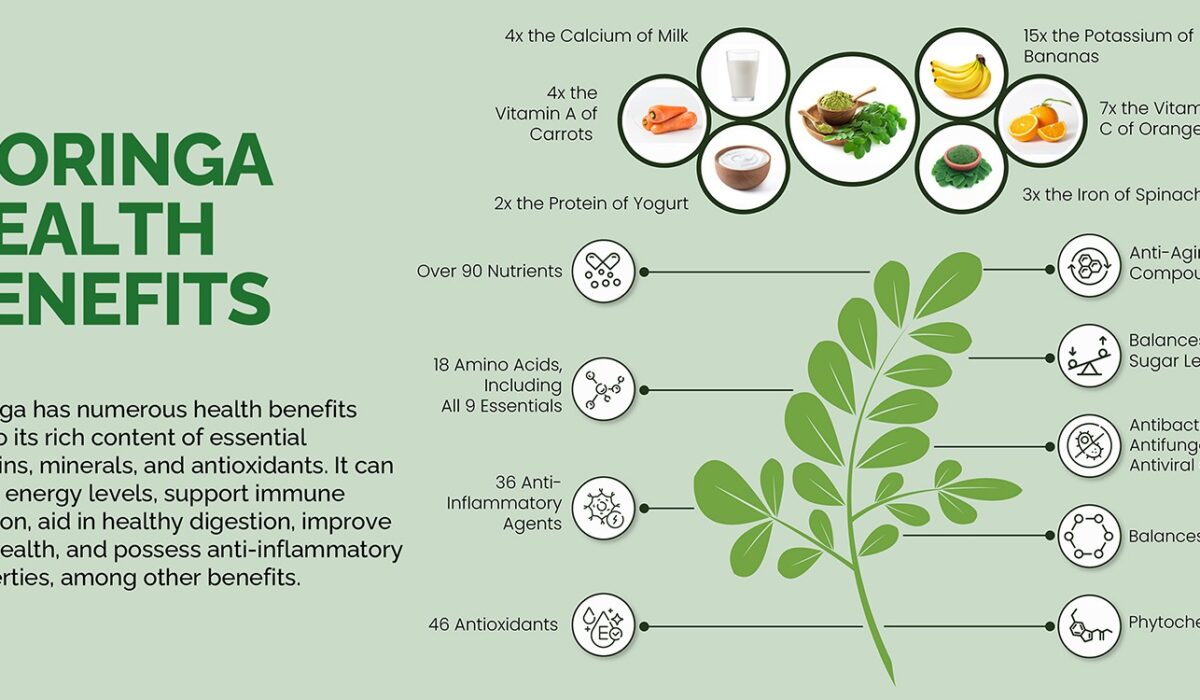Moringa & Breastfeeding Nutrients
Congratulations on entering the beautiful journey of motherhood! Breastfeeding is a remarkable gift that nourishes your baby and fosters a deep emotional connection. To support your well-being and optimize breastfeeding, consider the powerful benefits of Moringa. This nutrient-rich plant has a long history of use in traditional medicine and is known as a “galactagogue,” potentially enhancing lactation. In this article, we will explore the wonders of Moringa and its potential to boost milk supply and provide essential nourishment. We’ll discuss its nutritional benefits, preparations, safety considerations, and additional tips for successful breastfeeding. Remember to consult healthcare professionals for personalized advice. Let’s unlock the potential of Moringa and enhance your breastfeeding journey for both you and your little one.
Understanding the Breastfeeding Experience
Breastfeeding is a truly remarkable and invaluable experience for both the baby and the mother. It goes beyond being a source of essential nutrition and becomes a profound bond that nurtures the emotional connection between the two. As a new mother embarking on this journey, it is important to grasp the significance of breastfeeding and the challenges it can present.
Breast milk, often referred to as “liquid gold,” is a unique and miraculous substance. It is tailor-made to meet your baby’s specific nutritional needs, providing a perfect blend of proteins, carbohydrates, fats, vitamins, minerals, and antibodies. This incredible composition promotes healthy growth, supports the development of the immune system, and protects against a wide range of diseases and infections.
For the mother, breastfeeding is not only an act of love but also an opportunity for postpartum recovery. It triggers the release of oxytocin, a hormone that helps the uterus contract and return to its pre-pregnancy size. This natural process can assist in reducing postpartum bleeding and facilitating the healing process.
However, it’s essential to acknowledge that the breastfeeding journey may not always be smooth sailing. Many new mothers encounter challenges along the way. One common concern is maintaining an adequate milk supply. It is normal for mothers to worry if their baby is getting enough nourishment. Factors such as stress, fatigue, certain medications, and medical conditions can potentially affect milk production. It’s important to seek support and guidance from healthcare professionals if you have concerns about your milk supply.

In addition to concerns about milk supply, breastfeeding mothers must also prioritize their own nutritional needs. The act of breastfeeding requires extra energy and nutrients, as the body is working to produce milk. It is vital for mothers to focus on maintaining a well-balanced diet, staying adequately hydrated, and getting sufficient rest. Meeting your own nutritional requirements is crucial for both your well-being and the quality of breast milk you provide.
Understanding the challenges and needs of the breastfeeding experience sets the stage for exploring the potential benefits of incorporating Moringa into your breastfeeding routine. Moringa, with its impressive nutritional profile, can offer additional support in meeting the demands of breastfeeding while providing essential nourishment for both you and your baby.
As we move forward, we will delve into the rich nutritional benefits of Moringa, its potential to enhance milk supply, and various ways to incorporate it into your diet. However, it is important to remember that breastfeeding is a unique and personal journey. If you have any concerns or questions, always consult with healthcare professionals who can provide individualized guidance and support. Together, let’s explore the power of Moringa and unlock its potential to enhance your breastfeeding experience.
The Wonders of Moringa
When it comes to exploring natural supplements that can support breastfeeding and maternal health, Moringa stands out as a true wonder. This versatile plant, scientifically known as Moringa oleifera, has been gaining attention for its rich nutritional content and historical use in traditional medicine.
Moringa is often referred to as a “superfood” due to its exceptional nutrient profile. It is packed with vitamins, minerals, antioxidants, and phytonutrients, making it a powerhouse of nourishment. This natural abundance of nutrients is especially important for breastfeeding mothers, as their bodies require additional support to meet their own nutritional needs while producing milk.
One of the remarkable aspects of Moringa is its reputation as a “galactagogue.” This term refers to substances that have the potential to promote lactation and increase milk supply. Although scientific research on Moringa’s galactogenic properties is still limited, historical anecdotes and traditional beliefs have recognized its effectiveness in supporting breastfeeding.
Beyond its potential to enhance milk production, Moringa offers a range of other benefits for new mothers. Its rich antioxidant content helps combat oxidative stress, which can occur during the postpartum period. Antioxidants are essential for reducing inflammation, supporting the immune system, and protecting cells from damage caused by free radicals.
Moringa also contains essential amino acids, the building blocks of proteins that are vital for tissue repair, hormone production, and overall well-being. These amino acids are particularly important during the postpartum phase when the body is recovering from childbirth and supporting the growth of the baby.
Moreover, Moringa is a natural source of calcium, iron, and other minerals that are necessary for maintaining bone health, supporting red blood cell production, and preventing iron deficiency—an issue commonly faced by new mothers. By incorporating Moringa into your diet, you can potentially supplement these essential nutrients and support your overall maternal health.
In addition to its nutritional benefits, Moringa is known for its adaptogenic properties, which help the body adapt to physical and emotional stress. This can be beneficial during the demanding and often overwhelming period of early motherhood. Moringa’s adaptogenic qualities may contribute to improved energy levels, reduced fatigue, and enhanced overall well-being.
As you can see, Moringa is truly a remarkable plant that offers a wide array of potential benefits for breastfeeding mothers. Its impressive nutritional content, galactogenic properties, and adaptogenic qualities make it an intriguing natural supplement to support both lactation and maternal health.
Nutritional Benefits for New Mothers

As a new mother, your body undergoes significant changes, and your nutritional needs are elevated during the breastfeeding phase. This is where the nutritional powerhouse of Moringa comes into play, offering a wide range of benefits to support your postpartum recovery and overall maternal health.
Moringa is packed with an impressive array of nutrients that can provide you with the essential vitamins and minerals necessary for your well-being. It is a rich source of vitamin A, which supports healthy vision and immune function, and vitamin C, which aids in collagen production and boosts your immune system. These vitamins are particularly crucial during the postpartum period when your body needs additional support to heal and recover.
Furthermore, Moringa contains significant amounts of calcium, an essential mineral for maintaining strong bones and teeth, as well as promoting proper nerve and muscle function. Calcium is especially important for new mothers, as the demands of breastfeeding can deplete the body’s calcium stores. By incorporating Moringa into your diet, you can supplement your calcium intake and support your bone health.
Iron, another key mineral found in Moringa, is essential for preventing iron deficiency and supporting the production of red blood cells. Iron plays a vital role in combating fatigue and boosting energy levels, which is particularly relevant for new mothers who often experience tiredness due to the demands of caring for their baby. Ensuring an adequate iron intake through Moringa can help prevent iron deficiency anemia and contribute to your overall well-being.
In addition to vitamins and minerals, Moringa is also a valuable source of antioxidants. Antioxidants help neutralize harmful free radicals in the body, reducing oxidative stress and inflammation. This is particularly important during the postpartum period, as the body is recovering from childbirth and dealing with hormonal changes. By incorporating Moringa into your diet, you can provide your body with a natural defense against cellular damage and support your immune system.
Another notable benefit of Moringa is its high protein content. Protein is essential for tissue repair, cell growth, and hormone production. It supports your body’s recovery from childbirth and helps build and repair muscles. By ensuring an adequate protein intake through Moringa, you can assist in the healing process and maintain your strength and vitality during this transformative time.
Moringa’s unique combination of vitamins, minerals, antioxidants, and protein makes it a powerful natural supplement for new mothers. By incorporating Moringa into your daily routine, you can ensure that you are providing your body with the essential nutrients it needs to support your overall health and well-being during the breastfeeding phase.
Enhancing Milk Supply

Maintaining an adequate milk supply is a common concern for many breastfeeding mothers. The good news is that Moringa holds promise as a natural solution to enhance milk production and support lactation.
While scientific research on Moringa’s specific impact on milk supply is still limited, there is anecdotal evidence and historical use that suggest its effectiveness as a galactagogue. Moringa’s nutrient-rich composition, including vitamins, minerals, and phytonutrients, may contribute to increased milk production. The presence of compounds like calcium, iron, and protein in Moringa provides the building blocks necessary for milk synthesis.
In addition to its nutritional content, Moringa’s potential as a galactagogue may be attributed to its hormonal properties. It is believed to help balance hormones, particularly prolactin, which plays a crucial role in milk production. By supporting hormonal balance, Moringa can potentially stimulate lactation and improve milk flow.
While Moringa shows promise in enhancing milk supply, it’s important to note that individual results may vary. Every woman’s body is unique, and factors such as overall health, hydration, stress levels, and breastfeeding frequency can also influence milk production. It’s recommended to consult with healthcare professionals, such as lactation consultants or doctors, who can provide personalized guidance based on your specific circumstances.
Moringa vs Green Tea: A Comparison of Nutritional Benefits
When considering the use of Moringa to enhance milk supply, it’s advisable to start with a moderate dosage and monitor its effects. Moringa can be consumed in various forms, such as powdered supplements, capsules, or brewed as a tea. Experimenting with different preparations may help you find the most suitable and enjoyable way to incorporate Moringa into your breastfeeding routine.
However, it’s important to remember that Moringa should not replace a balanced diet or proper breastfeeding techniques. While Moringa can potentially support milk production, it is essential to establish a strong breastfeeding foundation through techniques like frequent nursing, proper latching, and maintaining skin-to-skin contact with your baby.
Moreover, seeking support from breastfeeding professionals and joining support groups can provide invaluable assistance and guidance on optimizing your milk supply. They can offer practical tips and techniques tailored to your individual needs.
Remember, every breastfeeding journey is unique, and it’s important to approach the use of Moringa as a supplement with caution. While it may offer potential benefits, it should not replace professional advice or medical support. By incorporating Moringa, along with proper nutrition, hydration, and support, you can create a nurturing environment that supports your breastfeeding goals.
Moringa Preparations for Breastfeeding Mothers

When it comes to incorporating Moringa into your breastfeeding routine, there are various preparations and methods to choose from. Each has its own advantages and considerations, allowing you to find the approach that best suits your preferences and lifestyle.
- Moringa Powder: Moringa powder is a popular and convenient option for breastfeeding mothers. It is made by drying and grinding the leaves of the Moringa plant into a fine powder. This powder can be easily added to your meals, smoothies, or beverages, making it a versatile choice for incorporating Moringa into your diet. Start with a small amount and gradually increase the dosage as needed, based on your desired effects and milk supply.
- Moringa Capsules: For those seeking a more straightforward and hassle-free option, Moringa capsules provide a convenient way to consume Moringa. These capsules contain Moringa powder in a concentrated form, making it easy to ensure a consistent dosage. Capsules are especially beneficial for busy mothers who prefer a quick and standardized method of supplementation.
- Moringa Tea: Moringa leaves can also be brewed into a flavorful and nourishing tea. Steeping dried Moringa leaves in hot water releases the plant’s beneficial compounds, creating a refreshing beverage. Moringa tea can be enjoyed on its own or combined with other herbal teas for added flavor. Sipping on Moringa tea can provide a soothing and calming experience while providing you with the potential benefits of Moringa.
When choosing Moringa preparations, it’s important to consider the quality and sourcing of the product. Look for reputable brands that offer organic, sustainably sourced Moringa to ensure you are getting a high-quality supplement. Pay attention to dosage instructions provided by the manufacturer and start with the recommended amounts, gradually adjusting as needed while monitoring your milk supply and overall well-being.
Incorporating Moringa into your diet should be seen as a complementary approach to a balanced and nutritious eating plan. It should not replace a varied diet that includes a wide range of fruits, vegetables, whole grains, lean proteins, and healthy fats. Aim to combine Moringa with other nutrient-dense foods to create a well-rounded and nourishing diet that supports your overall health and breastfeeding journey.
While Moringa preparations offer a convenient way to incorporate this superfood into your routine, it’s essential to remember that the true power of Moringa lies in its synergy with a healthy lifestyle, proper breastfeeding techniques, and seeking professional guidance when needed.
Safety Considerations
While Moringa offers potential benefits for breastfeeding mothers, it is important to approach its use with caution and consider certain safety considerations. Here are some key points to keep in mind when incorporating Moringa into your breastfeeding routine:
- Consult with Healthcare Professionals: Before adding any new supplement to your diet, it is crucial to consult with healthcare professionals, such as your doctor, lactation consultant, or a registered dietitian. They can provide personalized advice based on your specific health needs and any potential interactions with medications or existing conditions.
- Quality and Sourcing: Ensure that you select high-quality Moringa products from reputable sources. Look for certifications that guarantee organic cultivation and sustainable practices. This ensures that you are consuming Moringa that is free from harmful contaminants.
- Dosage and Moderation: Follow the recommended dosage instructions provided by the manufacturer. Starting with a lower dosage and gradually increasing it as needed can help monitor your body’s response and adjust accordingly. Remember, moderation is key when incorporating any supplement into your diet.
- Potential Side Effects: While Moringa is generally considered safe for most individuals, some people may experience mild side effects, such as digestive discomfort or allergic reactions. If you notice any adverse effects, discontinue use and consult with a healthcare professional.
- Medication Interactions: Moringa may interact with certain medications, such as blood thinners or medications for diabetes or high blood pressure. It is important to inform your healthcare provider about any supplements you are taking to ensure there are no potential interactions that could impact your health or the efficacy of your medications.
- Allergies: Individuals with known allergies to plants in the Moringaceae family, including Moringa, should exercise caution. If you have a history of allergies, it is advisable to consult with an allergist before incorporating Moringa into your diet.
- Breastfeeding Frequency: It’s important to maintain frequent breastfeeding or pumping sessions to stimulate milk production, as Moringa alone may not guarantee an increase in milk supply. Combining Moringa supplementation with proper breastfeeding techniques, such as feeding on demand and ensuring a good latch, can help optimize your breastfeeding experience.
| Thyroid Medicines | Particularly, Levothyroxine medicine. As moringa has the potential to increase thyroid function, it is advisable not to combine it with other thyroid medications. |
| Medicines broken down by the liver | Moringa may slow down the breakdown of medicines in the liver, this may lead to subsequent issues. |
| Diabetes | Both moringa and diabetes medicines reduce the amount of glucose in the blood. Taking both together can potentially cause a significant drop in blood sugar levels. |
| Blood pressure | Moringa has blood pressure-lowering properties, when taken with pressure medication it may cause your blood pressure to drop. |
Remember, every person’s body is unique, and what works for one individual may not work the same way for another. Pay attention to your body’s response to Moringa and monitor its effects on your milk supply, overall well-being, and any potential side effects.
Other Tips for Breastfeeding Success

Alongside Moringa, employ key tips to enhance breastfeeding experience and ensure success. Here are some valuable insights to support you on this beautiful journey:
- Establish a Good Latch: A proper latch is key to successful breastfeeding. Ensure that your baby is positioned correctly, with their mouth covering a significant portion of the areola. This helps ensure effective milk transfer and prevents discomfort or nipple soreness. Seek guidance from a lactation consultant if you encounter any difficulties in achieving a good latch.
- Seek Support: Don’t hesitate to reach out for support from professionals, such as lactation consultants or breastfeeding counselors, who can provide guidance, answer your questions, and address any concerns you may have. Additionally, joining support groups or connecting with other breastfeeding mothers can provide a valuable network for sharing experiences and advice.
- Practice Self-Care: Taking care of yourself is essential during the breastfeeding phase. Get sufficient rest, eat a balanced diet, and stay hydrated. Self-care boosts energy and well-being, vital for supporting milk production.
- Foster Skin-to-Skin Contact: Skin-to-skin contact has numerous benefits for both you and your baby. It promotes bonding, regulates the baby’s body temperature, and stimulates milk production. Spend quality time with your baby through skin-to-skin contact, especially during feeding sessions.
- Avoid Stress: Stress can negatively impact milk production. Find ways to manage stress, such as practicing relaxation techniques, engaging in gentle exercise, or seeking emotional support. Creating a calm and nurturing environment can contribute to a more positive breastfeeding experience.
- Stay Hydrated: Adequate hydration is crucial for maintaining milk supply. Drink plenty of water throughout the day to replenish your fluids. Make it a habit to keep a water bottle nearby during breastfeeding sessions as a reminder to stay hydrated.
- Trust Your Instincts: Remember that you are the best advocate for your baby. Trust your instincts and listen to your body. Every breastfeeding journey is unique, and what works for others may not necessarily apply to your situation. Be patient with yourself and your baby as you both navigate this special bond.
Combine tips, Moringa benefits for a supportive breastfeeding environment. Remember, breastfeeding is a beautiful and rewarding journey that requires patience, perseverance, and self-care.
Are Moringa Seeds Safe to Eat?
Conclusion
Congratulations on embarking on the incredible journey of breastfeeding! Throughout this article, we have explored the potential benefits of incorporating Moringa into your breastfeeding routine. Moringa, a galactagogue with a rich nutrient profile, supports milk supply and maternal health.
We highlighted breastfeeding’s importance and the unique composition of tailor-made breast milk. We explored challenges for breastfeeding moms and how Moringa can aid in milk supply and nutrition.
Also highlighting its rich nutritional content, galactogenic properties, and adaptogenic qualities. Moringa’s abundance of vitamins, minerals, antioxidants, and protein make it a powerful ally for new mothers during the breastfeeding phase.
Throughout the article, we emphasized the importance of approaching Moringa with caution and consulting healthcare professionals for personalized advice. Safety considerations covered quality, dosage, side effects, medication interactions, and individual response awareness.
We shared key tips for successful breastfeeding: latch, support, self-care, skin-to-skin, stress management, and hydration.
As we conclude, remember that breastfeeding is a unique and personal journey. While Moringa shows promise, it is only one piece of the puzzle. A holistic approach that encompasses proper nutrition, self-care, and seeking professional support is key to a successful breastfeeding experience.
Embrace this beautiful journey with confidence, knowing that you have the knowledge and resources to support your breastfeeding goals. Embrace the bond, nourish with breast milk, and discover Moringa’s breastfeeding benefits. Trust your instincts, seek support when needed, and relish this extraordinary chapter of motherhood.
Wishing you a fulfilling and rewarding breastfeeding experience filled with love, nourishment, and joy.
References
https://www.ncbi.nlm.nih.gov/books/NBK501899/
https://www.medicalnewstoday.com/articles/319916
https://www.webmd.com/vitamins/ai/ingredientmono-1242/moringa
Moringa With Barry stores offer a variety of moringa products. These include: Moringa Powder, Moringa Tea, Moringa Capsules and Moringa Oil.




